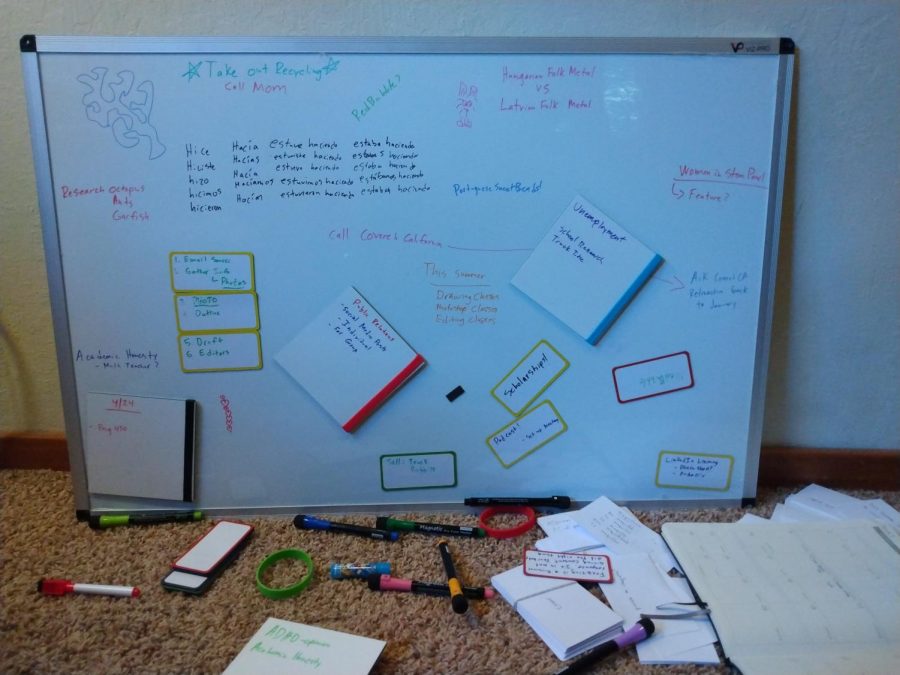Society focuses on the wrong problem when dealing with ADHD
Successful doesn’t mean mentally well
Whiteboards, calendars, alarms and timers help keep someone with ADHD on track, but they don’t treat the underlying problem. A brain with ADHD has different brain chemistry than most people, so executive functioning is impaired. (Photo Illustration by Megan Wutzke)
When I was 20, I went to therapy. I had depression, anxiety, and a bit of trauma to work through. After a few sessions, my therapist suggested I get tested for ADHD.
I laughed because I couldn’t have ADHD. I was a former gifted child. My grades and test scores were excellent. People with ADHD couldn’t do that. The boy from sixth grade with ADHD couldn’t sit in his chair and had frequent meltdowns. That wasn’t me.
Society taught me that the problem with ADHD was that “those people” weren’t productive. They couldn’t get anything accomplished. According to society, if you fix the productivity problem, then you fix the person. Society focuses solely on a person’s work output. Success is defined by how much stuff a person gets done.
But ADHD bleeds into every aspect of your life, not just your work output and society needs to focus on mental health, not productivity.
Five years after that particular therapist, I tried to commit suicide. Fifteen years of mental illnesses and trauma had finally hit a breaking point. After I failed, I was determined to get my life back on track. I went to a new therapist. She brought up ADHD. This time, I let her explain.
Yes, I was successful. I was an expert in “fake it until you make it.” But I struggled in a completely different way than most people. My anxiety wasn’t like “normal” anxiety.
I didn’t really understand. Anxiety is anxiety, right?
But maybe I did have ADHD. It didn’t matter though, because I was there to focus on trauma. I wanted to get back to that conversation. ADHD treatment could wait.
When I was 28, I decided to try to go back to school. Again. Fifth time’s the charm, right?
My first semester at American River College went great. I had straight A’s. I was the perfect, hyper-focused student.
But inside, I was a mess. I didn’t understand how I could do so well on tests but couldn’t accomplish simple tasks like remembering to take out the trash. This anachronism gave me anxiety. How come everyone else could do this, and I couldn’t? Could this be part of the maybe-ADHD?
So, I got an ADHD specialist. She asked about my anxiety, my daily struggles, and my childhood.
The therapist informed me that out of 22 criteria, I displayed 21 severe symptoms of ADHD. I had some answers. The specialist and I came up with a plan for treatment.
After a few weeks of medication allowing my dopamine and norepinephrine receptors to work, the anxiety I had been living with my entire life disappeared.
My brain stopped thinking all the thoughts at the same time. My brain suddenly knew how to prioritize. My brain stopped yelling at me that I had to do everything at once.
Medication doesn’t solve everything. I still need to find my own motivation. But having my brain slow down enough to accomplish a task is life changing.
When I told my mother that I had been diagnosed with ADHD, she told me she already knew that. She had known since I was in elementary school.
I never paid attention. I never listened. I interrupted constantly. I switched interests monthly. I constantly forgot my homework. I read under my desk when the teachers were talking. My room, my locker, and my desk were full of clutter. I skipped class by hiding in the library.
Teachers made me skip recess. My parents grounded me. Every adult nagged, lectured, pleaded, rewarded and ultimately punished me. Nothing worked.
I was labeled an “absent-minded professor.” “Creative but unfocused.” “Gives up too easily.”
But I got good grades, so why would my parents bother getting treatment for me?
Studies have shown that people with ADHD are five times as likely to try to commit suicide as someone without ADHD. In my case, mental illness and trauma created the perfect storm. On the outside, I looked successful. On the inside, I was chaos.
I’ll never know how my life would be different if I had gotten treatment sooner. But I worry about other young, ditzy women who aren’t getting help because they are “productive.” Our society needs to focus on mental health, not productivity. Everyone, not just those with ADHD, will benefit.









Megan Wutzke • May 11, 2021 at 12:50 pm
Hello Alex, excellent question! I did do well on the first stimulant medication prescribed; however the first dosage wasn’t strong enough for me. The second dosage we tried was too strong, and the third dosage in the middle was in my goldilocks zone. I could tell right away, even with the first light dosage, that my anxiety was decreased significantly, but this will be different for every person.
Of course, I don’t know your own relationship with mental health care, but finding medication that works with your particular brain chemistry is always a journey. Previously, I had been prescribed SSRI’s and I felt little difference. For many people, SSRI’s are a lifesaver. Everyone’s journey is different, so I highly recommend finding a doctor who listens to you.
Thank you for the question!
Alex • May 8, 2021 at 8:38 pm
Ms. Wutzke, did you start seeings results with the very first medication you tried? I hope you won’t mind answering, but which medication worked for you and when did you first start noticing its effects